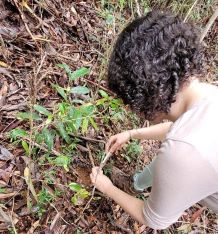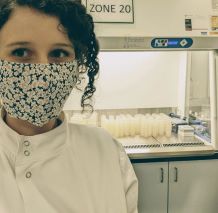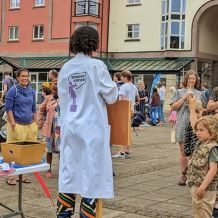
Rebekah presenting her research at #Worm23 in Glasgow this year. Photo credit: Taufiq Kahn.

Rebekah collecting soil samples in Brazil in January to look for nematodes. Photo credit: Jéssica Castro

A lab selfie of Rebekah in front of the flow hood, preparing Petri dishes for her experiments.

Rebekah presenting at Soapbox Science this year. Photo credit: Sariqa Wagley
Interview with a Soapbox Scientist: Rebekah White
For the first time in history, humans can expect to live beyond sixty years of age. Indeed, the average lifespan in the United Kingdom is now eighty years old; a decade longer than we could have expected sixty years ago, and around thirty years longer than 1900. This is a huge leap forward in terms of lifespan. However, it also raises questions about quality of life, and whether and how we can maintain a good quality of life in our ever-increasing elderly years.
Ageing (i.e., becoming weaker, more frail and more prone to disease over time) is a bit of an evolutionary puzzle. Most of us are familiar with Darwin’s theory of natural selection: that those who survive to reproduce pass their DNA down to the next generation, who thus inherit the successful genetic properties of their parents. When evolutionary scientists think about age in terms of natural selection, this raises a bit of a dilemma. Why would the DNA that means that individuals age, rather than stay fit and healthy forever, be so successful that every single organism seems to do it?
Rebekah White, a doctoral researcher at the University of Exeter, studies the phenomenon of ageing. She told me the main theory behind why ageing happens. “When you are young, natural selection effects are strong because you need to survive to reproduce. Basically, when you finish reproducing and any necessary parenting, you’ve now handed down your DNA and your offspring have successfully left your care. Natural selection can’t “touch” you at that point. And the same will be true of your offspring when they get old - they’ll have their offspring, and then they’ll begin to age, but natural selection can’t touch them either because they already reproduced.”
Rebekah is interested not only in the evolutionary theory behind why ageing occurs, but also in understanding how we can slow the ageing process down. In particular, she is interested in increasing something called ‘healthspan’. Having never heard of this term before, I ask Rebekah what this means. “It’s the length of time we remain healthy. By increasing healthspan, we can keep quality of life as high as possible for as long as possible.”
The way that Rebekah researches healthspan is by studying microscopic worms called nematodes. “Like most organisms, nematodes age. I test different medicines on the nematodes and measure their longevity, but also, importantly, I look at measures of healthspan.” To do this, she collects all sorts of information on the nematodes as they age, from how well their muscles work, to what their intestines look like, to how mobile they remain and how frequently they succumb to age-related diseases. In parallel to these measures, she looks at what the worms’ DNA is doing by investigating ‘gene expression’. This means, in simple terms, looking at which sections of DNA are active. Putting all these pieces of information together, Rebekah can gain insights into whether and how certain medicines might influence human ageing. “It may sound surprising, but at a genetic level nematodes and humans have a lot of similarities. So, medicines that have positive influences on nematodes might have a positive effect on humans.” Of course, all these medicines go through intense clinical trials before ever being tested on humans. Rebekah’s research is essentially one of the first steps in discovering which medicines might be effective in increasing human lifespan and healthspan.
Rebekah didn’t always have her heart set on this topic of research, but after studying evolution in school, she became fascinated with the subject. After completing her undergraduate dissertation on infectious disease, she moved onto a master’s degree on infectious cancer and genetics, and then started her PhD on disease genetics. “I wouldn’t say I ever had a certain direction in mind, I just followed the things that fascinated me. Because I’m so interested in my work, it makes me good at what I do.” The academic journey hasn’t always been straightforward, and Rebekah said there was a period of time when her confidence was knocked down. “In the end though, that has made me stronger and more able to stand up for myself and for my science. Having a supportive research community around me helped me through those hard times, and I strive to be that supportive person for other people now.”
Rebekah’s work has already made the headlines. Her undergraduate research made a splash when it was published at the beginning of the pandemic. It was highly relevant to the COVID-19 pandemic because it highlighted understudied animals that were likely to be hosts of viruses which could mutate to infect humans. While her current research may not have made the news just yet, it is also of crucial importance for human health. “Everyone we know who lives into old age will experience age-linked decline, and this is becoming more and more of an issue the longer we live. We need to find out how to keep living happy, healthy lives well into old age. By trying to increase healthspan, we may naturally increase lifespan too, but the aim is really in improving our quality, rather than the quantity, of life.”
